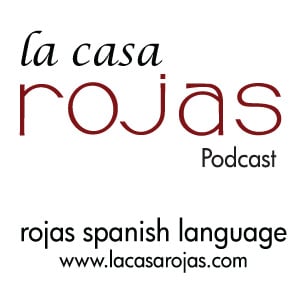
Vital stats:
Format: a man speaks of many things — in Spanish
Episode duration: 5m-30m
Frequency: maybe not a going concern, but 71 episodes exist
So here’s one entirely in Spanish. If you don’t understand that language, I won’t stop you scrolling on, but if you understand even a little bit of it — or if you want to understand all of it — you might consider having a listen. On La Casa Rojas [RSS] [iTunes], the Peruvian-born, St. Paul-based Spanish teacher Luis Rojas talks about events in his life, events in the world at large, events in history, and the many vagaries of language-learning. A simple premise, to be sure, but I listen to a great many language podcasts, and at least half of them complicate themselves straight out of usefulness. This one has held to a certain purity. You want to learn Spanish? Then hey, listen to a man speak Spanish for a while.
Put the foreign linguistic element aside — not that it makes much sense to do so here — and this show would seem to follow a common but usually unfortunate podcasting form: some guy talking about stuff. But even when I began listening, my Spanish rusted to near-uselessness, the impressive friendliness of Rojas’ personality shone through. You don’t realize the rarity of this until you hear it; I get the sense that most podcasters, eager to quickly scrape together whatever audience they can, affect sour pusses and hope to gather listeners under the banner of common (if exaggerated) prejudices. The strain of this charade, I would guess, has become a leading cause of the disease known as podfade. But Rojas comes across as a genuinely friendly, open fellow, just the sort of person you hope for when you know you’ll miss some to most of the meaning of each sentence spoken. Should I go to a word like “avuncular” here? Or perhaps the closest Spanish equivalent I can find, the awfully literal “de tío”?
What’s more, Rojas’ choices of topics seem equally reflective of his personality. Some episodes verge on the academic: popular music in Latin America between 1960 and 1965 [MP3] [MP3], using the always-tricky subjunctive [MP3], the word quedar [MP3]. Others connect to to his heritage: the reign of Peru’s controversial president Alberto Fujimori [MP3], the distinctive street sounds of his homeland [MP3], the origin of the pisco sour [MP3]. And then we have the episodes that, by the standards of language-learning programs, rank as almost startlingly personal: heart trouble in the family [MP3], his ride on a Grayhound bus [MP3], what Supertramp meant to him during his adolescence in military-governed Peru [MP3]. One of Rojas’ most endearing mannerisms surfaces whenever he mentions his American wife, Joan, or as he almost invariably says, “Mi esposa — Joan.” I don’t know how well it comes across in text, but he tends to say it with that odd pause and emphasis, like he’s afraid of forgetting her name. Joan, a student of Spanish, actually turns up on the podcast now and then. As she tells it, learning the language no era tan fácil como pensaba [MP3].
But by now, you surely sense that the resemblances between La Casa Rojas and garden-variety “some guy talking about stuff” podcasts, even those in Spanish, stop at the superficial. The complexities of Rojas’ topics, the considerations inherent in compressing them into five- to thirty-minute episodes, and the necessity of hitting certain linguistic points along the way force him into what sounds like no small amount of scripting and editing. (Supertramp cannot simply be described, after all; Supertramp must be heard — in fair-use-sized clips, of course.) Even so, the most valuable things I learn about the mechanics of Spanish while listening tend to come neither directly from the subject of the day nor the parts of grammar explicitly described. The importance of music in the life of Luis Rojas, for instance, has not been lost on me, nor has his tendency to describe speaking and listening to languages in musical terms. When one day he happened to mention his experience of Spanish-speaking students learning by replicating sounds and English-speaking students learning by internalizing written words, some important undergirding element of my foreign-language education — obviously, one too important to describe with much clarity — locked in.
As with any language-learning podcast, I recommend listening to each episode of La Casa Rojas definitely not once, and not just twice, but at least thrice. Given its 71-strong archive, that practice gives you over 35 hours of Spanish-language listening to do. Confusingly, Rojas hasn’t posted a new episode since March, but hope against podfade springs eternal. But even if we already possess the complete Rojas canon, it still provides a comfortable, well-positioned step in this particular podcast-based linguistic journey. If you lack any Spanish whatsoever, you might consider beginning with something like Coffee Break Spanish, moving up to its successor Show Time Spanish, putting in those 35 hours with La Casa Rojas, and then steeling yourself for the sufficiently vast realm of podcasts made for native Spanish speakers. Watch out; those guys talk a lot faster than Luis Rojas. Sometimes they’re barely avuncular at all. Nada de tío. Completamente nada.
Comment or suggest a podcast on the Podthoughts forum thread
[Podthinker Colin Marshall hosts and produces Notebook on Cities and Culture [iTunes]. Contact him at colinjmarshall at gmail or follow him on Twitter @colinmarshall.]